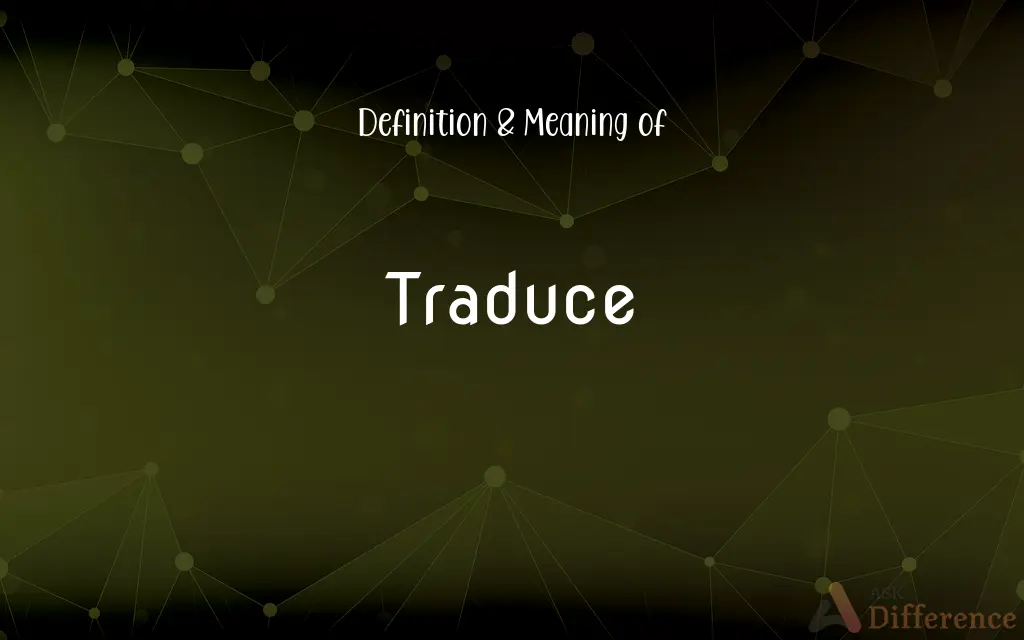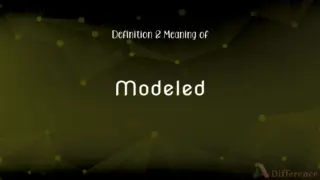Traduce Definition and Meaning
Edited by Tayyaba Rehman — By Fiza Rafique — Published on May 9, 2024
Traduce refers to speak maliciously and falsely of; to slander or defame someone. e.g., The politician felt his opponent tried to traduce his character during the debate.

Table of Contents
Traduce Definitions
To defame or slander publicly.
He sued for libel after being traduced in the online forum.
To damage someone’s honor by spreading lies.
His opponent’s campaign tried to traduce his achievements.
To betray someone by misrepresentation.
She felt traduced by her friend's false testimony.
To convey false impressions that damage someone’s reputation.
His words were taken out of context to traduce his image.
To falsely criticize someone's reputation.
Tabloids often traduce celebrities with little regard for the truth.
To speak harmful untruths about someone.
The article was designed to traduce her and diminish her credibility.
To spread false and malicious statements about someone.
He found himself being traduced by anonymous sources.
To malign someone to diminish their reputation.
Rumors were spread to traduce the CEO’s integrity.
To speak ill of someone deceitfully.
The controversy centered on allegations used to traduce the senator.
To make false or malicious statements about (someone) in order to cause humiliation or disgrace.
To fail to uphold; disregard or violate
"The appearance of things is ... that we have traduced our policy and violated our principles" (Patrick J. Buchanan).
(transitive) To malign a person or entity by making malicious and false or defamatory statements.
To pass on (to one's children, future generations etc.); to transmit.
To pass into another form of expression; to rephrase, to translate.
To transfer; to transmit; to hand down; as, to traduce mental qualities to one's descendants.
To translate from one language to another; as, to traduce and compose works.
To increase or distribute by propagation.
From these only the race of perfect animals were propagated and traduced over the earth.
To draw away; to seduce.
I can forget the weaknessOf the traduced soldiers.
To represent; to exhibit; to display; to expose; to make an example of.
To expose to contempt or shame; to represent as blamable; to calumniate; to vilify; to defame.
The best stratagem that Satan hath . . . is by traducing the form and manner of them [prayers], to bring them into contempt.
He had the baseness . . . to traduce me in libel.
Speak unfavorably about;
She badmouthes her husband everywhere
To tell lies about someone to cause harm.
They used social media to traduce their rival.
Traduce Snonyms
Slander
To make false spoken statements damaging to a person’s reputation.
She threatened to sue if he continued to slander her name.
Defame
To damage someone's good reputation by making false statements.
The journalist refused to defame someone without proof.
Smear
To damage the reputation of someone by false accusations; slander.
The smear campaign was brutal and unfounded.
Disparage
To degrade, to speak of someone in a derogatory manner.
The critic used his influence to disparage the film director.
Calumniate
To make false and defamatory statements about.
She accused her colleague of trying to calumniate her.
Besmirch
To tarnish someone's reputation.
They attempted to besmirch her character with baseless accusations.
Vilify
To speak or write about in an abusively disparaging manner.
He was unfairly vilified in the press.
Denigrate
To criticize unfairly; to attack the reputation of.
His achievements were denigrated by his enemies who envied his success.
Libel
To defame someone in writing.
The celebrity faced libel for the statements published in the magazine.
Malign
To speak harmful untruths about; speak evil of.
His intent was to malign his former partner out of spite.
Traduce Example Sentences
It's unethical to traduce someone just because you disagree with them.
Celebrities often have to deal with efforts to traduce their reputations.
Sometimes, political campaigns will traduce the character of an opponent.
Misinformation can easily traduce the public image of an individual.
People should be cautious not to traduce others without evidence.
Social media platforms can be used to traduce others anonymously.
He was afraid that the leaked emails would traduce his reputation.
It's important to consider the impact before you traduce someone publicly.
When rumors start to traduce a person’s character, they can be hard to stop.
Common Curiosities
How many syllables are in traduce?
There are two syllables in "traduce."
Why is it called traduce?
"Traduce" comes from the Latin word "traducere," which means to lead along as a spectacle, expose to contempt, or to disgrace.
What is a stressed syllable in traduce?
The stressed syllable in "traduce" is the first: "TRA-duce."
How do we divide traduce into syllables?
Traduce is divided into syllables like this: tra-duce.
What is the verb form of traduce?
"Traduce" itself is a verb.
What is the root word of traduce?
The root word of "traduce" is the Latin "traducere," meaning to lead along, expose, or disgrace.
What is the first form of traduce?
The first form of "traduce" is "traduce."
What is the third form of traduce?
The third form of "traduce" is "traduced."
How is traduce used in a sentence?
Traduce is used to describe the act of slandering or defaming someone, often by spreading false information.
What is the pronunciation of traduce?
Traduce is pronounced as /trəˈduːs/.
What part of speech is traduce?
Traduce is a verb.
Is traduce a noun or adjective?
Traduce is a verb.
Is traduce an adverb?
No, traduce is not an adverb.
What is the second form of traduce?
The second form of "traduce" is "traduced."
What is another term for traduce?
Another term for traduce is "slander."
What is the plural form of traduce?
"Traduce" does not have a plural form as it is a verb.
Is traduce an abstract noun?
No, traduce is a verb, not a noun.
Is traduce a vowel or consonant?
The word traduce starts with a consonant.
Is traduce a countable noun?
Traduce is not a noun; it is a verb.
What is the opposite of traduce?
The opposite of traduce could be "praise" or "commend."
Is traduce a negative or positive word?
Traduce is a negative word, as it involves defaming or slandering someone.
Is the word traduce imperative?
Traduce can be used in the imperative form in commands or requests, e.g., "Do not traduce her!"
Is the word traduce a Gerund?
No, "traducing" would be the gerund form of the verb "traduce."
Which article is used with traduce?
As a verb, "traduce" doesn’t typically use an article. When discussing the act itself, "the" might be used, e.g., "the traducing of."
What is the singular form of traduce?
The singular form of traduce is "traduce."
Is the traduce term a metaphor?
No, "traduce" is not typically used as a metaphor; it is a direct verb meaning to slander or defame.
Which determiner is used with traduce?
Determiners are not typically used with the verb "traduce." It may appear with articles or possessives if referring to the action or concept, e.g., "the act of traducing."
Which vowel is used before traduce?
When necessary, any vowel can precede "traduce" depending on the context, such as in "to traduce."
Is traduce a collective noun?
No, traduce is not a collective noun; it is a verb.
Is the word “traduce” a Direct object or an Indirect object?
In a sentence, "traduce" would be the verb, not an object. The direct object would be the person being traduced.
Which preposition is used with traduce?
Common prepositions used with "traduce" include "by" and "in," as in "traduced by" or "traduced in."
Which conjunction is used with traduce?
Common conjunctions that might be used with "traduce" include "and" or "but," depending on the sentence structure.
Share Your Discovery

Previous Term
Modeled Definition and Meaning
Next Term
Shrewd Definition and MeaningAuthor Spotlight
Written by
Fiza RafiqueFiza Rafique is a skilled content writer at AskDifference.com, where she meticulously refines and enhances written pieces. Drawing from her vast editorial expertise, Fiza ensures clarity, accuracy, and precision in every article. Passionate about language, she continually seeks to elevate the quality of content for readers worldwide.
Edited by
Tayyaba RehmanTayyaba Rehman is a distinguished writer, currently serving as a primary contributor to askdifference.com. As a researcher in semantics and etymology, Tayyaba's passion for the complexity of languages and their distinctions has found a perfect home on the platform. Tayyaba delves into the intricacies of language, distinguishing between commonly confused words and phrases, thereby providing clarity for readers worldwide.

































